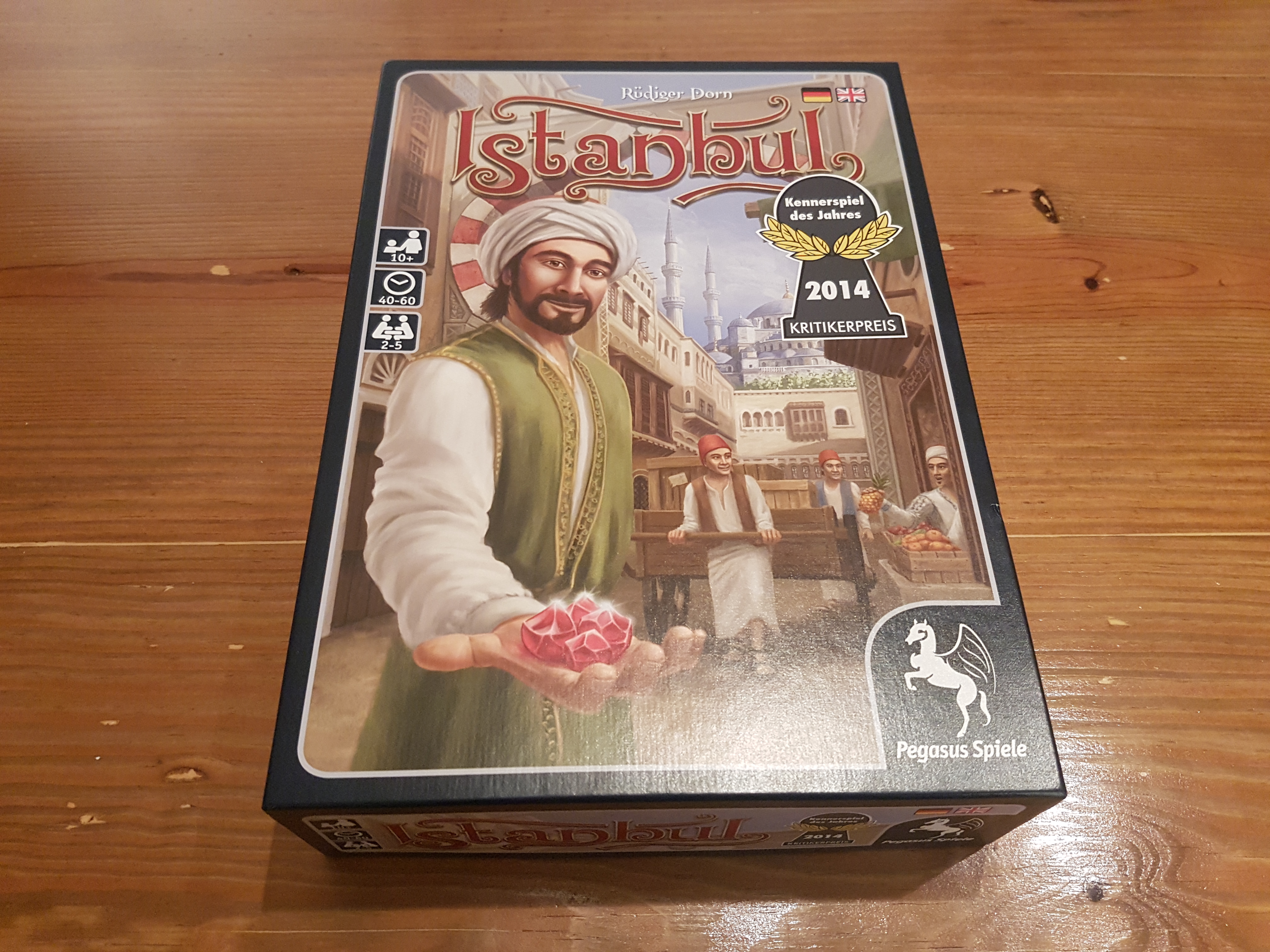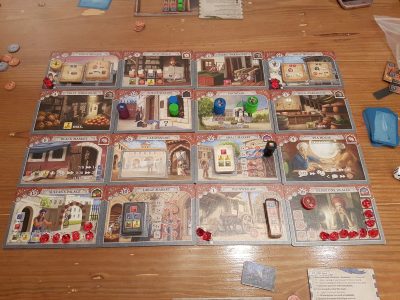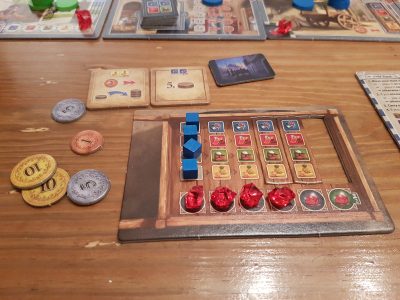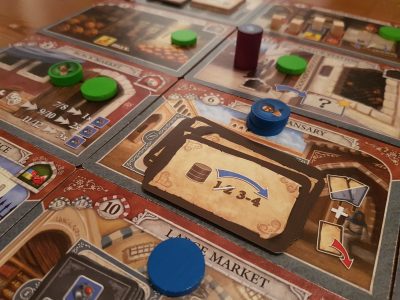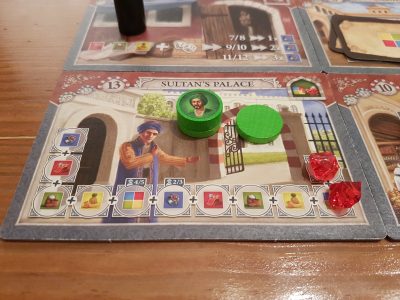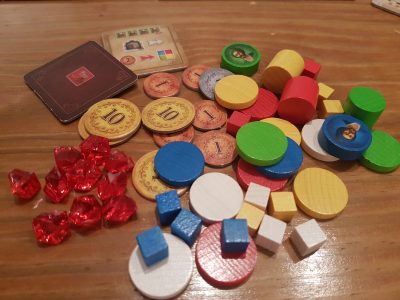Istanbul is a pick up and deliver board game from designer Rüdiger Dorn and publisher Pegasus Spiele. The game sees 2 – 5 players become wheelbarrow towing merchants in the busy Grand Bazaar of Istanbul, for around 45 – 60 minutes. Goods such as fruit and spices must be transported and sold, family members can be bailed from jail and more. The aim is to be the first merchant to have collected a predetermined number of rubies. However, is Istanbul a gem of a game or does it need some extra polish to shine? Let’s find out!
At the start of the game each merchant starts out at the fountain, one of Istanbul’s 16 locations, with 4 assistants stacked underneath. Everyone’s money is low, wheelbarrows are half built and even a single Ruby seems a long way off. Each turn consists of a maximum of four parts, though commonly only 2 stages will be conducted. Move and actions will be the stages that make up the majority of turns, though the order always must be: move, merchant encounter, action then other encounters.
Movement sees the player take their stack, including their merchant token and assistant tokens, and moving it by either 1 or 2 tiles. By default, it is not possible to stay on a location or travel greater than two tiles on a turn, so planning ahead is key. After movement the player must if possible either leave behind or pick up an assistant. If they are unable to their turn is now over, unless they end on the starting tile (The Fountain). After dropping off or picking up a worker, if another player’s merchant is already at that location you must pay them two Lira. Choose not to or don’t have the funds and your turn is over.
Next up is when the player gets to choose whether or not to perform an action. What you can do depends on the tile your merchant is on. Each of the 16 locations has a different action but there are 4 main categories. Starting off there are tiles such as Warehouses or the Post Office which will see the player earn goods, which are kept in their wheelbarrow. Next, the markets enable players to exchange goods for money. The Mosques allow merchants with goods to earn a Mosque tile, which give bonuses such as a fifth assistant. Finally, there are locations where goods or money can be traded for rubies.
The path to victory may seem an easy one, gain goods to sell followed by using money to buy rubies. However, other unique actions allow players to store more goods at a time, gain bonus cards and even gamble. One of the most unique locations is the Police Station where players can send out a family member to any location on the board, dodging any encounters. The second best to highlight is the Caravansary where bonus cards are earnt and discarded. These give little one-time benefits, such as moving 3-4 spaces on a turn, getting a good of any type or being able to do specific location actions twice.
Bonus cards sound like they are occasionally used, though it is rare in Istanbul for a few rounds to occur without at least one being played. The bonuses can massively change the outcome of the game so you cannot ignore their potential. To some extent they should be referred to as integral cards not bonus cards, as keeping hold of them is often detrimental.
After the action phase is when beneficial encounters occur. If another players family member, the Governor or the Smuggler are on the tile you’re on then an encounter is triggered. Opponent’s family members are instantly sent back to the police station, netting the player a reward of a bonus card or 3 Lira. The Governor and Smuggler work in a similar way to each other, offering the player a way to get a good or bonus card respectively. Once the interaction has taken place the dice are rolled to determine the encountered bonus giver’s new location.
Players cannot keep simply moving and taking actions as eventually they will run out of assistants, unless they consistently backtrack. The best analogy I can come up with is like being in charge and going to the shops with your family when all the best deals are on. At the start you’ll be racing around going from one place to another getting the benefits. All of a sudden, the rest of the deals are out of reach and you’ll have to either retrace your steps to pick up lost family members or go to a place to beckon them all back to you. This beckoning place being the fountain in Istanbul. Play continues in this fashion until one player gains 5 rubies and triggers the end of the game.
One aspect that I hope other games follow is how in Istanbul there are no victory points. There may be an item, in the form of rubies, which are effectively the same but they are an item within the game world rather than just a generic “point”. Players get the sense that they are working their way up the ladder earning goods for Lira to eventually purchase a Ruby. On top of this, throughout the entire game everyone can see how close you are to getting the 5 Rubies needed to win.
Not only are rubies common knowledge, everything is on show apart from bonus cards. Due to this, players can interpret where others will be heading based upon how much Lira they have, the goods in their wheelbarrow and even how close someone is to a complete full-sized cart. This does introduce a slight negative into two player games, where players can sometimes tell whom the winner will be before the game ends. This results in one or two turns at the end of the game feeling fruitless, though at least there isn’t a runaway winner issue, as right up to this end point the game is often incredibly close.
Istanbul may last 45 minutes but it doesn’t feel like it, with each turn being quick. Each action is incredibly simple yet they all build up to something more impressive than you started out with. The feeling of speed is compounded by the snowball like effect as the game progresses and players are able to gain more goods at a time and rake in higher amounts of money. The game is all about getting the perfect combinations, and route across the Bazaar. Just make sure you don’t run out of assistants otherwise actions become limited.
The game may look a bit daunting to new players but the combination of iconography, a dedicated cheat sheet tile for each player and the simplicity of individual actions makes it a breeze to teach. The same symbols keep recurring so even before finishing the rules, players will be able to start to work the rest out. Even when the turn phases slip from memory or a new bonus card appears the cheat sheet is there to help. The best bit is Istanbul can grow with the players, from an easy to learn game into one where each player will develop personal strategies.
Istanbul combines pick up and deliver mechanics with worker placement to trigger actions. On top of this the whole game sees players in a race to collect rubies. Each time a player takes an action that gets them a ruby or mosque tile the same option becomes more expensive for their opponents. This sees players all grabbing different benefits in an attempt to at least have something to cheer about. In other games this rush and race may falter with unbalanced powers on offer yet try as I might I have been unable to exploit any major advantage from them.
The production quality is on the whole great, though a few niggles stop the game excelling. The components included in the box are some of the best I’ve ever used. The board is constructed out of thick chunky cardboard tiles, the player pieces are all out of wood and the Ruby gemstones that players are aiming to collected are simply epic. The artwork adorning the tiles is fantastic until you notice what is missing. According to the board game there are no females in Istanbul, it’s something that once you notice you cannot un-see and it just doesn’t make sense for the locations.
I cannot fault it to date but I do have a slight irrational annoyance caused by games with stickers on components. When they eventually get scuffed via play or when put on slightly skewwhiff they let down the visual quality of the title. For the sake of the production quality, and my inability to perfectly align stickers onto components, I hope games steer away from stickers and onto designed custom components with artwork on them.
While there aren’t additional tiles to be shuffled into the mix, the 16 tiles in the box offer a solid amount of replayability. As soon as the game starts to feel a little samey changing up the board setup from the easy “short path” tile order to “long path” order alone can help breath a wave of new into the game. Players can even go beyond this by shuffling the tiles to make a random map. All of a sudden, the routes players took, knowing they could gain X resource followed by selling them at the markets could be impossible. Strategies must be adapted, reacting to where locations end up giving every game its own challenges.
Istanbul perfectly strikes the balance between having unlimited great options with a leash that often reins players in. The use of simply, easy to teach, actions in a game that has depth creates a wonderful potential for getting those new to the hobby into more serious games. There is a speed yet enough choice to enable strategies to flourish and fail. Aside from glaring oversight that sees no female presence in Istanbul the artwork and quality of the components are truly top notch. This all builds together to create a thematic pick up and deliver experience I keep wanting to play again and again.
[Editor’s Note: Istanbul was provided to us for the review by Pegasus Spiele.]

